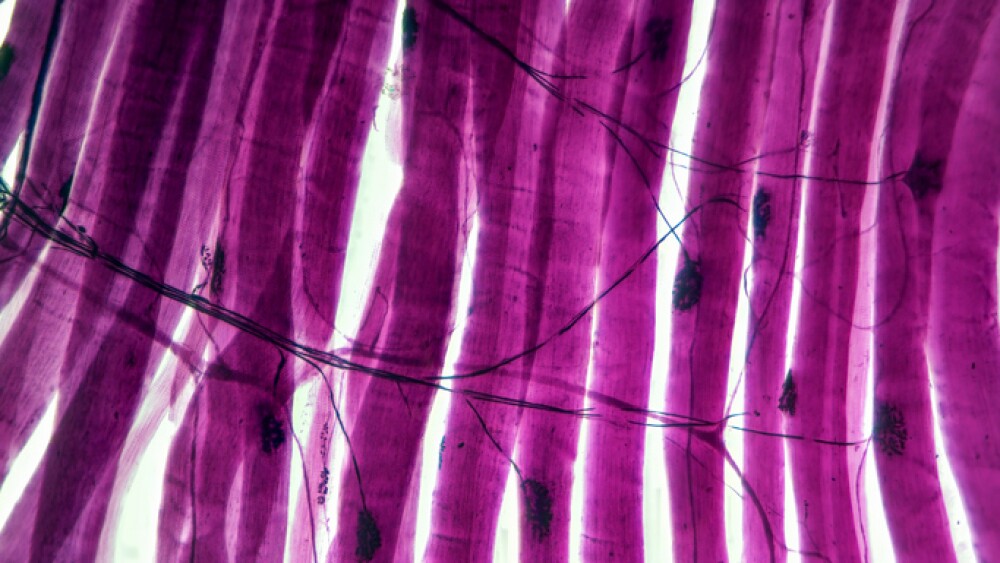MediciNova, Inc. announced that MediciNova’s collaborator, Perenlei Enkhbaatar, MD, PhD, FAHA, Professor, Department of Anesthesiology, Director, Translational Intensive Care Unit, Charles Robert Allen Professor in Anesthesiology, University of Texas Medical Branch, presented new data and results of a nonclinical study evaluating MN-166 in a CIALI model at the SOT 63rd Annual Meeting and ToxExpo in Salt Lake City, Utah.
LA JOLLA, Calif., March 12, 2024 (GLOBE NEWSWIRE) -- MediciNova, Inc., a biopharmaceutical company traded on the NASDAQ Global Market (NASDAQ:MNOV) and the Standard Market of the Tokyo Stock Exchange (Code Number: 4875), today announced that MediciNova’s collaborator, Perenlei Enkhbaatar, MD, PhD, FAHA, Professor, Department of Anesthesiology, Director, Translational Intensive Care Unit, Charles Robert Allen Professor in Anesthesiology, University of Texas Medical Branch, presented new data and results of a nonclinical study evaluating MN-166 (ibudilast) in a chlorine gas-induced acute lung injury (CIALI) model at the Society of Toxicology (SOT) 63rd Annual Meeting and ToxExpo in Salt Lake City, Utah.
The primary objective of this nonclinical efficacy study was to determine the safety and pharmacological activity of MN-166 (ibudilast) following ALI induced by chlorine (Cl2) gas inhalation in a clinically relevant translational ovine model. In this study, single-dose and multi-dose treatments were evaluated. The primary endpoint was the mean change in the pulmonary function measure PaO2/FiO2, which is the ratio of arterial oxygen partial pressure to fractional inspired oxygen. Additional endpoints included survival, lung mechanics, lung injury, and edema formation evaluated by chest x-ray.
The highlights of the presentation, entitled “Evaluation of safety and pharmacological activity of MN-166 (ibudilast) in a clinically relevant ovine model of chlorine-induced acute lung injury” (Abstract # 4296), are as follows:
After a Cl2 gas challenge (210 ppm x 30 min) to induce moderate ALI (mean PaO2/FiO2<200 mmHg), the test subjects were randomly assigned to 4 treatment groups: MN-166 (ibudilast) low dose (10 mg) or high dose (20 mg), a positive control (rolipram 1 mg), and vehicle (negative control). Cl2 gas concentration of 210 ppm x 30 min was expected to result in a 20 - 30% mortality rate (Fukuda 2015).
Treatment regimens:
- Single-dose treatment (n=5/group) in which a 30-min IV infusion was given once only, initiated 30 min after completion of the Cl2 challenge
- Multi-dose treatment (n=3/group) in which 30-min IV infusions were given a total of 4 times, initiated 30 min after the completion of Cl2 gas challenge, then every 12 hours
Efficacy Result
- Single-dose treatment
- MN-166 (ibudilast) 20 mg and rolipram treatment resulted in greater improvement in mean PaO2/FiO2 and peak airway pressure but dissipated after Hour 12
- Multi-dose treatment
- MN-166 (ibudilast) 20 mg showed greater improvement in mean PaO2/FiO2 ratio (p=0.0001), with animals recovering enough to no longer meet the criteria of ARDS (Berlin ARDS definition 2012)
- MN-166 (ibudilast) 20 mg also showed greater improvement in peak airway pressure (p<0.05), plateau airway pressure (p<0.05), pulmonary artery pressure (p<0.05), and lung injury score (p<0.05) compared to the other treatment groups
- MN-166 (ibudilast) 20 mg also maintained cardiac and kidney function compared to the other treatment groups
- Notably, significance was observed beyond the T=12-hour timepoint, further reinforcing the observed benefit of MN-166 (ibudilast) 20 mg with the multi-dose treatment regimen
Survival
- MN-166 (ibudilast) 20 mg treatment demonstrated a greater survival benefit than the other treatment groups. All animals in the MN-166 (ibudilast) 20 mg group (8 out of 8) survived the 48-hour monitoring period, while 25% (2 out of 8 / arm) animals were euthanized early in other groups upon reaching the euthanasia criteria.
Kazuko Matsuda, MD, PhD, MPH, Chief Medical Officer of MediciNova, Inc., commented, “We are very pleased to report the positive results in which MN-166 demonstrated a large and significant improvement in pulmonary function and recovery, i.e., no longer having ARDS, attenuation of lung injury, and a higher survival rate in the ovine CIALI model study. Collectively, positive findings from this clinically relevant ovine model, the previously reported lipopolysaccharide (LPS)-induced ARDS nonclinical model, and significant positive results from a clinical trial in hospitalized COVID-19 patients at risk of developing ARDS, we believe MN-166 (ibudilast) shows promise as a candidate for ALI.”
This project has been funded in whole or in part with federal funds from the Department of Health and Human Services; Administration for Strategic Preparedness and Response; Biomedical Advanced Research and Development Authority, under contract number 75A50121C00022.
About MN-166 (ibudilast)
MN-166 (ibudilast) is a small molecule compound that inhibits phosphodiesterase type-4 (PDE4) and inflammatory cytokines, including macrophage migration inhibitory factor (MIF). It is in late-stage clinical development for the treatment of neurodegenerative diseases such as ALS (amyotrophic lateral sclerosis), progressive MS (multiple sclerosis), and DCM (degenerative cervical myelopathy); and is also in development for glioblastoma, Long COVID, CIPN (chemotherapy-induced peripheral neuropathy), and substance use disorder. In addition, MN-166 (ibudilast) was evaluated in patients that are at risk for developing acute respiratory distress syndrome (ARDS).
About MediciNova
MediciNova, Inc. is a clinical-stage biopharmaceutical company developing a broad late-stage pipeline of novel small molecule therapies for inflammatory, fibrotic, and neurodegenerative diseases. Based on two compounds, MN-166 (ibudilast) and MN-001 (tipelukast), with multiple mechanisms of action and strong safety profiles, MediciNova has 11 programs in clinical development. MediciNova’s lead asset, MN-166 (ibudilast), is currently in Phase 3 for amyotrophic lateral sclerosis (ALS) and degenerative cervical myelopathy (DCM) and is Phase 3-ready for progressive multiple sclerosis (MS). MN-166 (ibudilast) is also being evaluated in Phase 2 trials in Long COVID and substance dependence. MN-001 (tipelukast) was evaluated in a Phase 2 trial in idiopathic pulmonary fibrosis (IPF) and a second Phase 2 trial in non-alcoholic fatty liver disease (NAFLD) is ongoing. MediciNova has a strong track record of securing investigator-sponsored clinical trials funded through government grants.
Statements in this press release that are not historical in nature constitute forward-looking statements within the meaning of the safe harbor provisions of the Private Securities Litigation Reform Act of 1995. These forward-looking statements include, without limitation, statements regarding the future development and efficacy of MN-166, MN-001, MN-221, and MN-029. These forward-looking statements may be preceded by, followed by, or otherwise include the words “believes,” “expects,” “anticipates,” “intends,” “estimates,” “projects,” “can,” “could,” “may,” “will,” “would,” “considering,” “planning” or similar expressions. These forward-looking statements involve a number of risks and uncertainties that may cause actual results or events to differ materially from those expressed or implied by such forward-looking statements. Factors that may cause actual results or events to differ materially from those expressed or implied by these forward-looking statements include, but are not limited to, risks of obtaining future partner or grant funding for development of MN-166, MN-001, MN-221, and MN-029 and risks of raising sufficient capital when needed to fund MediciNova’s operations and contribution to clinical development, risks and uncertainties inherent in clinical trials, including the potential cost, expected timing and risks associated with clinical trials designed to meet FDA guidance and the viability of further development considering these factors, product development and commercialization risks, the uncertainty of whether the results of clinical trials will be predictive of results in later stages of product development, the risk of delays or failure to obtain or maintain regulatory approval, risks associated with the reliance on third parties to sponsor and fund clinical trials, risks regarding intellectual property rights in product candidates and the ability to defend and enforce such intellectual property rights, the risk of failure of the third parties upon whom MediciNova relies to conduct its clinical trials and manufacture its product candidates to perform as expected, the risk of increased cost and delays due to delays in the commencement, enrollment, completion or analysis of clinical trials or significant issues regarding the adequacy of clinical trial designs or the execution of clinical trials, and the timing of expected filings with the regulatory authorities, MediciNova’s collaborations with third parties, the availability of funds to complete product development plans and MediciNova’s ability to obtain third party funding for programs and raise sufficient capital when needed, and the other risks and uncertainties described in MediciNova’s filings with the Securities and Exchange Commission, including its annual report on Form 10-K for the year ended December 31, 2023 and its subsequent periodic reports on Form 10-Q and current reports on Form 8-K. Undue reliance should not be placed on these forward-looking statements, which speak only as of the date hereof. MediciNova disclaims any intent or obligation to revise or update these forward-looking statements.
INVESTOR CONTACT:
Geoff O’Brien
Vice President
MediciNova, Inc.
info@medicinova.com






